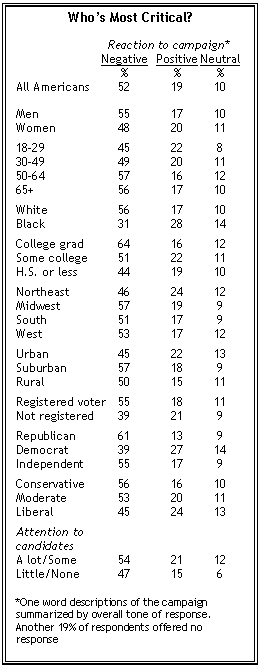by Richard Morin
The final votes won’t be counted for another 15 months, but the 2008 presidential campaign already seems to be wearing out its welcome with many Americans. When asked to sum up their impression of the early-blooming campaign in a word, a majority of the public has a negative assessment, while just one-in-five has a kind — or even mildly favorable — thing to say.

Who are this year’s nattering nabobs of negativism, and how deep is their frustration? The latest national survey by the Pew Research Center for the People & the Press suggests that these tough critics tend to be older rather than younger, white rather than black, and men rather than women. They’re more likely to live in the suburbs than the city or country and more concentrated in the Midwest than in the East. They also are more affluent and better educated than the typical American.
To be sure, there’s nothing new in public disdain for political campaigns — it’s almost a national birthright. In fact, judged against some key standards of history, the 2008 race isn’t doing all that badly. A relatively large minority of Americans — at least in comparison with public opinion at this stage of previous presidential contests — say they’re interested and engaged by the 2008 campaign. It’s also notable what many of this year’s critics are most upset about. Their biggest beef is with the early start of Campaign 2008, rather than with the candidates themselves or the issues or tone of the contest. The single most frequently volunteered impression of the presidential race so far: Too early.
To measure the public’s first reactions to the campaign, a representative sample of 1,503 Americans was asked in late July what one word or phrase best summarized their impressions of the presidential race. Then Pew analysts coded each response as positive, negative or neutral. In all, slightly more than half (52%) of the sample used a negative word or phrase to describe the campaign, while 19% had a positive reaction and 10% offered a neutral term.
An analysis of the survey results shows that Americans at or near the top of the income and education ladder are the most uncomplimentary about the presidential campaign. Nearly two-thirds (64%) of all college graduates describe the campaign negatively, compared with 44% of those who have not attended college. Among those with postgraduate degree, fully 70% have a negative impression of the race.
The survey also reveals a modest gender gap on impressions of the campaign: 55% of all men but just 48% of women have a negative view, while women are slightly more likely than men (20% vs. 17%) to feel favorably. Older men in particular are sour about the race: 64% of all men 50 years old or older but 52% of women that age offered negative evaluations. (Among those younger than 50, the gap closed significantly: 49% of men and 46% of women are displeased with the campaign.)
Those disapproving older men are, in large part, responsible for a substantial generation gap in impressions of the campaign. Nearly six-in-10 (57%) of those 50 and older had a negative view of the campaign, compared with 48% of younger adults.
The survey also found that blacks are considerably less critical of the race than are whites — and also significantly less likely to have formed an impression. A majority (56%) of whites offered a negative view, nearly double the proportion of blacks (31%) who had a similar reaction. Blacks also are the most positive of any of the groups analyzed; overall, African Americans are 11 percentage-points more likely than whites to volunteer a positive view (28% vs. 17%). Blacks also are 10 points more likely to say they have not yet formed an impression of the campaign.
Midwesterners and suburbanites are more negative about the campaign than are residents of other regions. Nearly six-in-10 Midwesterners (57%) offer a negative view; in contrast, fewer than half (46%) of East-coast residents are similarly sour. Suburbanites are significantly more negative than city dwellers (57% vs. 45%) while urbanites are more upbeat than rural residents (22% vs. 15%).
Finally, there’s a sharp partisan difference in the early evaluations of this campaign. A larger proportion of Republicans (61%) are negative about the campaign than Democrats (39%) or independents (55%). Liberals, too, are less critical: Less than half (45%) had thought negatively about the race, compared with 56% of conservatives and 53% of moderates.
To be fair to Campaign 2008, the most frequent criticism of the races had nothing to do with the worthiness of the candidates or the quality of the debate. In addition to too early phrases such too long and premature were frequently used by respondents to describe their reactions.
While hardly positive, these terms suggest irritation and weariness rather than outright disgust or anger. Moreover, a positive reaction – Interesting — was the second-most frequently encountered impression of the campaign, an evaluation that echoes other survey results suggesting a larger share of Americans are paying attention to this presidential contest today than at a similar point in other recent presidential races.
Still, disparaging evaluations are more common than compliments: boring, a joke and bad were frequently volunteered. And Americans who said they have been thinking hard about the presidential candidates are more negative than those who have given the hopefuls little or no consideration — a result that suggests engagement and familiarity may breed some measure of disapproval, at least so far in this presidential campaign.
(For a full list of the words people used to describe the campaign, see the Pew Research Center for the People & the Press’ survey report: “A Summer of Discontent with Washington“)



